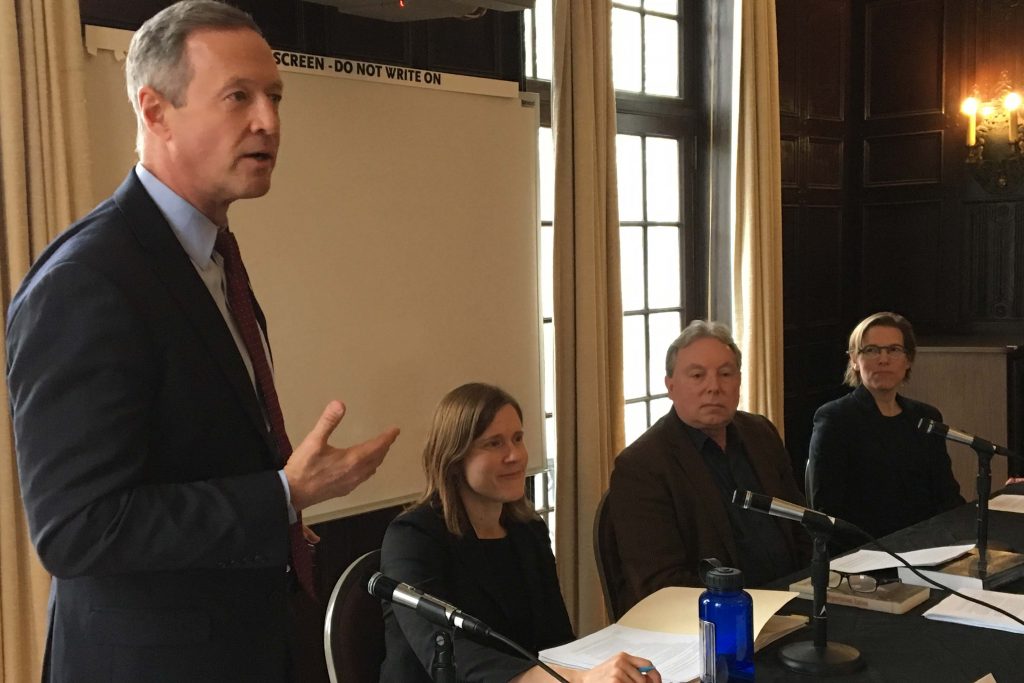“Just because a battle is uphill does not mean we should run downhill away from it,” BC Law Professor Dan Kanstroom said at a hastily organized panel discussion January 31 on the legal and practical implications of President Trump’s executive order: “Protecting the Nation from Foreign Terrorist Entry into the United States.”
Kanstroom, a director of Boston College’s Center for Human Rights and International Justice, was joined on the panel by BC Law Professors Mary Holper and Kari Hong; all three are immigration experts. The discussion was moderated by Martin O’Malley, a distinguished visiting professor at BC’s Rappaport Center for Law and Public Policy, which sponsored the event.
As a self-described “generalist” on the matter, O’Malley, a 2016 presidential candidate and former governor of Maryland, offered introductory remarks about the essential contributions of immigrants and refugees, explained the exceptionality of the recent events, and shared his own experiences on the campaign trail meeting families fearing deportation. He closed by telling the crowd of mostly aspiring lawyers: “There’s never been a time where we need lawyers more than now…These are real repercussions that we’re dealing with.”
Professor Kanstroom provided an overview of immigration and refugee laws in the US as well as a history of the constitutional and legal principles at stake. He cited Thomas Paine, George Washington, and James Madison as those who saw this as a nation of asylum for the persecuted.
But he also acknowledged a long history of anti-immigrant movements. “The debates between…principles of openness versus xenophobic fear were present from the start of the Republic and in many ways they have not changed a great deal since then,” he said. “This is where the peculiar aspects of immigration law as a strange sub-set of constitutional law become relevant and important for us to understand as a legal matter.”
Kanstroom expressed some pessimism about the chances of court challenges against the order, but said, “It seems to me that the fight is worth having in courts and elsewhere—even if the prospects of victory are not bright. This is because the controversy over these orders reflects deep unresolved tensions in this nation’s understanding of itself as a nation dedicated to immigrants, to refugees and asylum, and to the rule of law.”
Professor Hong focused her remarks on increased measures against those with criminal convictions. She refuted the truth of much of President Trump’s campaign rhetoric about rapists, murderers, and drug dealers crossing US borders. “He is equally lying about crimes and immigrants,” she said, providing non-citizen crime figures, levels of violent crime in the US, and the number of non-citizens crossing the southern border (in both directions).
Hong, who is director of the BC Ninth Circuit Appellate Program, which provides pro bono student representation to non-citizens with criminal convictions, predicted that the president’s executive orders will intensify punitive measures against non-citizens. “Under Trump’s plan, the numbers of those subject to immediate arrest and detention and deportation will be in the double-digit millions,” she said.
“Getting resettled as a refugee to the US was already tantamount to winning the lottery before this executive order,” said Holper, who directs the BC Law Immigration Clinic. She checked off a list of the “very strenuous and stringent” hurdles they must overcome, among them a referral from the United Nations, an interview with the Department of State, and security checks by multiple intelligence agencies.
She called the halting of the refugee program for 120 days “unprecedented,” and stressed the importance of the US having a tolerant and humane refugee and immigration policy. If the US isn’t proactive or a leader on this issue, the inaction could cause a “snowball in lethargy for the rest of the world,” she said.
Following the panelists’ remarks, O’Malley opened up the discussion to the crowd. Though the event was billed as a discussion on Trump’s executive order, the Q&A topics ranged widely, from the rule of law to border patrol to sanctuary cities.
While the lingering mood was rather bleak, there were moments of levity and positivity. At one point, Kanstroom read the Emoluments Clause from a pocket Constitution. The panelists jokingly mulled an O’Malley 2020 presidential run. Members of the audience chimed in with helpful ways to get involved and reasons to stay hopeful.
As the event wrapped up, the panelists shared parting words of urgency and measured optimism. It is critical, they seemed to agree, to continue applying pressure and resistance in the face of such a legally and constitutionally contentious situation.
Pictured, left to right, Rappaport Distinguished Professor Martin O’Malley, Professor Mary Holper, Professor Daniel Kanstroom, and Professor Kari Hong


